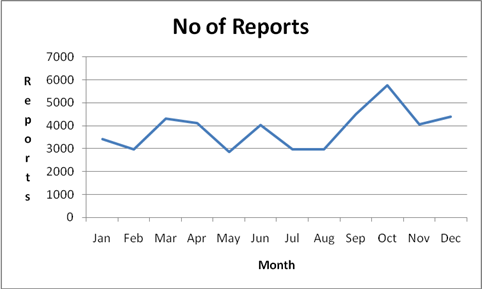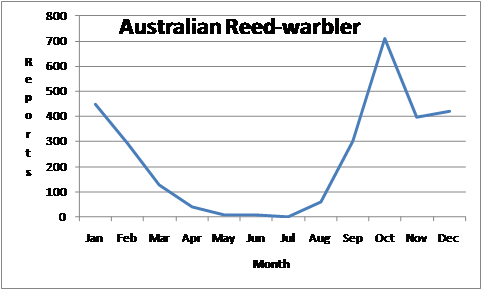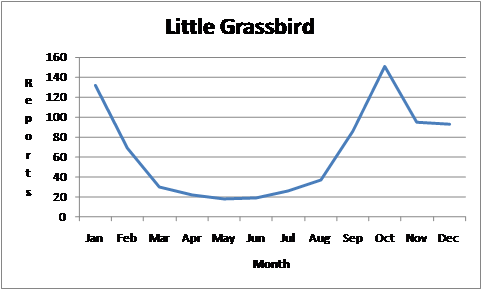Hello everyone
I have three graphs from the COG databases (but NOT the GBS) which may shed a little light, and raise some more questions about Benj’s speculation about whether winter warblers and grassbirds are not there at all or simply under-reported.
The first graph is based on the 46386 sheets in the database, going as far back as 1974, although the number of records this old is quite small.

You can see the pattern does drop bit in the winter months, but people are still surveying.

The graph speaks for itself. Since 1974 there have been very very few observations in the winter months, despite the fact that there is a considerable amount of surveying going on. October shows the most observations, with 700 reports of ARW sightings. The sharp drop from October to November is interesting. Perhaps the strains of parenthood ? The database breeding records for this species are pretty patchy, but the major activity in October is nest building, with the first dependent young turning up in November.

The LGB shows a similar pattern, although the number of sightings is only a fifth of the ARW. However, there are more reports of this species in the winter months than for the ARW.
There are only 23 breeding reports for this species, the majority(14) being dependent young in February followed by dependent young in December (6). There are only 3 records in Oct-Nov one carrying food, and two nestbuilding.
Cheers
Paul
Paul Fennell
Editor Annual Bird Report
COG Databases Manager
026254 1804
0407105460
From: Whitworth, Benjamin [
Sent: Tuesday, 23 August 2011 12:46 PM
To:
Subject: [canberrabirds] LG: WBSE, L grassbird & Reed warblers, Swallows & Martins, Cormorants [SEC=UNCLASSIFIED]
Other usual water birds were abundant everywhere- eg moorhens, swamphens, coots, black and wood ducks. I’m wondering whether a lack of surveying and the fact reed warblers and L grassbirds are quieter in winter is the reason for them not being recorded in winter in addition to migration.
Benj
------
IMPORTANT - This email and any attachments have been issued by the Australian Government Department of Agriculture, Fisheries and Forestry (DAFF). The material transmitted is for the use of the intended recipient only and may contain confidential, legally privileged, copyright or personal information. You should not copy, use or disclose it without authorisation from DAFF. It is your responsibility to check any attachments for viruses and defects before opening or forwarding them.
If you are not an intended recipient, please contact the sender of this email at once by return email and then delete both messages. Unintended recipients must not copy, use, disclose, rely on or publish this email or attachments. DAFF is not liable for any loss or damage resulting from unauthorised use or dissemination of, or any reliance on, this email or attachments.
If you have received this e-mail as part of a valid mailing list and no longer want to receive a message such as this one, advise the sender by return e-mail accordingly.
This notice should not be deleted or altered.
------

